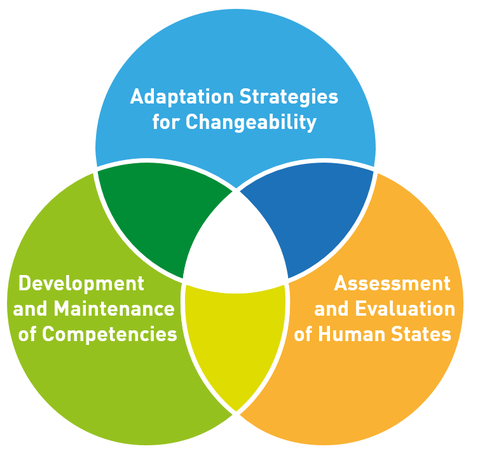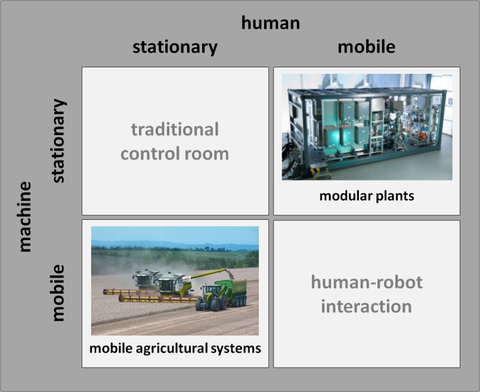GRK 2323: Förderliche Gestaltung Cyber-Physischer Produktionssysteme
Projektinformation
Projektdauer: 2018-2022
Sprecher: Prof. Leon Urbas
Projektpartner:Prof. Raimund Dachselt, Prof. Thomas Herlitzius, Prof. Hagen Malberg, Prof. Susanne Narciss, Prof. Sebastian Pannasch,Prof. Martin Schmauder, Prof. Ralph Stelzer, Prof. Leon Urbas
Website: https://tu-dresden.de/ing/forschung/grk2323/
Vorhabensbeschreibung
Das GRK beschäftigt sich mit der Gestaltung der Kooperation von Mensch und Maschine in cyber-physischen Produktionssystemen (CPPS). CPPS bestehen aus einer Kombination von vernetzten digitalen (cyber) und physischen Systemkomponenten. Ihre Architektur ermöglicht es, innerhalb kürzester Zeitspannen Systemänderungen vorzunehmen. Die daraus resultierende Flexibilität erfordert neue Formen der Mensch-Technik-Kooperation. Deshalb setzt das GRK den vorherrschenden technikzentrierten Ansätzen eine menschzentrierte Perspektive zur Gestaltung von CPPS entgegen.

Gesamtstruktur des GRK
Zentrales Anliegen ist es, Erkenntnisse zur förderlichen Gestaltung von CPPS im Hinblick auf die Kompetenz, die Gesundheit und das Vertrauen von Operateuren zu gewinnen. Drei thematische Cluster stehen dabei im Mittelpunkt des Interesses: Adaptationsstrategien für wandelbare Systeme, die Entwicklung und Aufrechterhaltung von Kompetenzen sowie die Erfassung und Bewertung menschlicher Zustände. Zu diesen Themen wird ein Team von Ingenieuren, Psychologen, und Arbeitswissenschaftlern theoretische Konzepte kombinieren und adaptieren, die bisher nur innerhalb der Grenzen relativ unabhängiger Forschungstraditionen bearbeitet wurden. Das Team wird neue Methoden entwickeln und diese in prototypischen Systemen evaluieren, um eine empirische Basis für Design und Interventionen herzustellen. Die Forschungsarbeiten erfolgen in zwei Anwendungsdomänen, modularen Prozessanlagen und mobilen Agrarsystemen. Dadurch wird es möglich, die Erkenntnisse und Lösungsansätze auf bei breites Feld von CPPS-Domänen zu generalisieren.
Das interdisziplinäre Qualifikationsprogramm bietet lokale wie internationale Mentoring- und Trainingsbausteine. Es beinhaltet einerseits Bausteine zur Reflexion und Diskussion der Ziele, Werte und Methoden der beteiligten Disziplinen, andererseits ein Lehrprogramm an der Schnittstelle von Ingenieurwissenschaften und Psychologie, sowie verschiedene Formen des Austauschs mit internationalen Experten. Zur Förderung der interdisziplinären Kooperation und Kommunikation ist das GRK als ein Projekthaus organisiert, das sich in unmittelbarer Nähe zu den Laboren der Antragsteller befindet. Die Doktorandinnen und Doktoranden werden von zwei Antragstellern aus unterschiedlichen Disziplinen betreut. Auf diese Weise können sie einerseits Kenntnisse über die wissenschaftlichen und methodischen Traditionen der beteiligten Disziplinen erwerben, aber andererseits von dem Innovationspotential an den Schnittstellen zwischen den Disziplinen profitieren.
